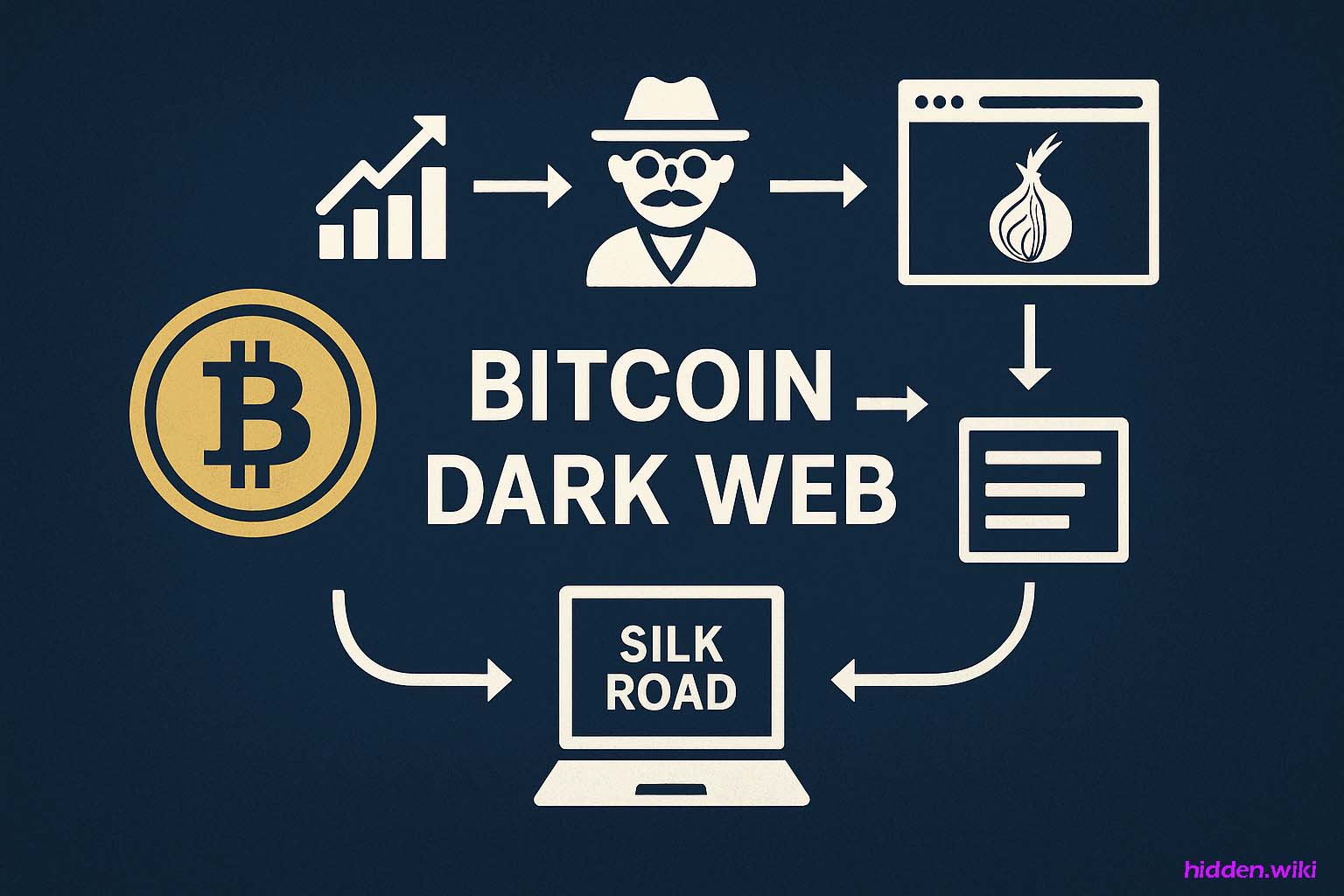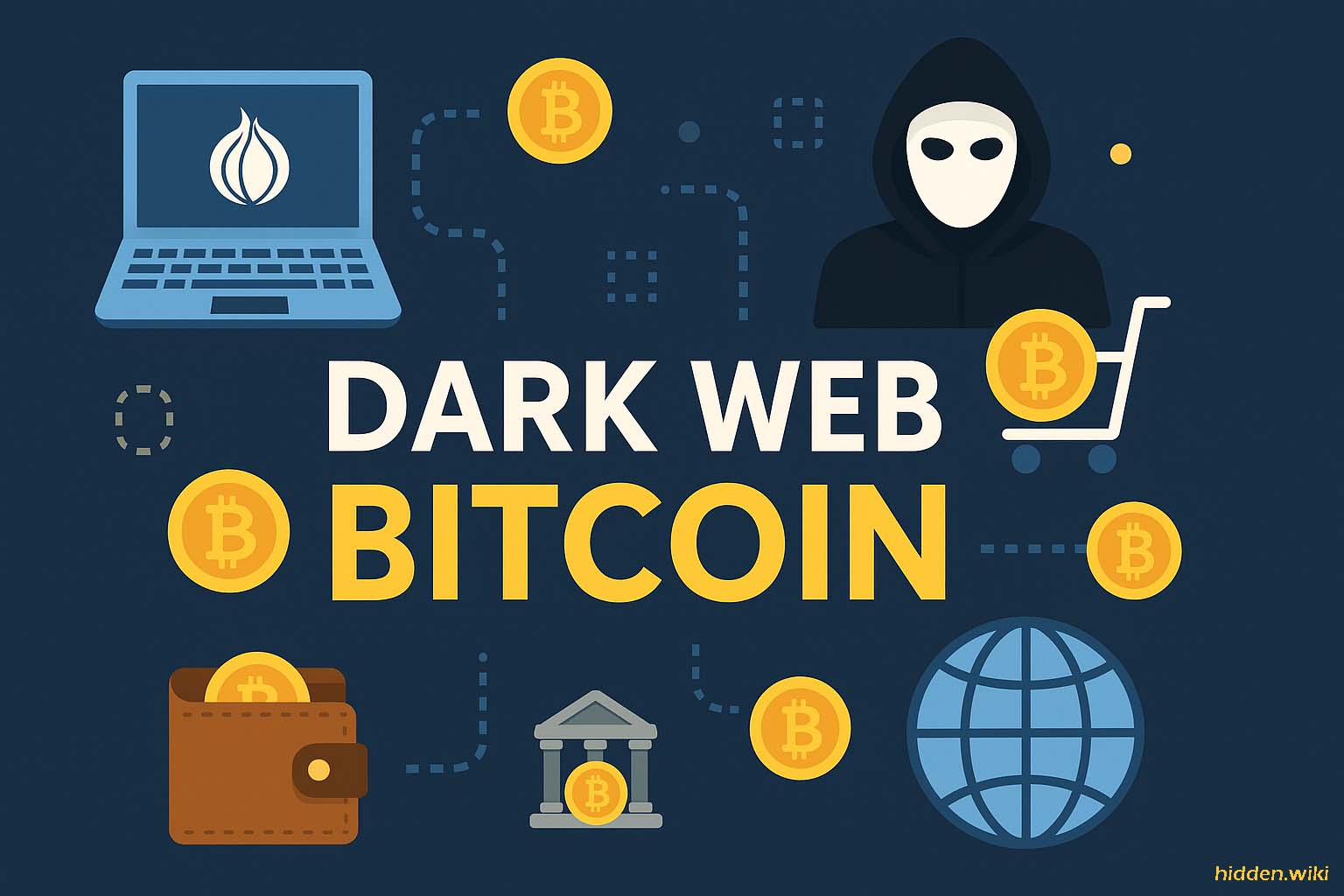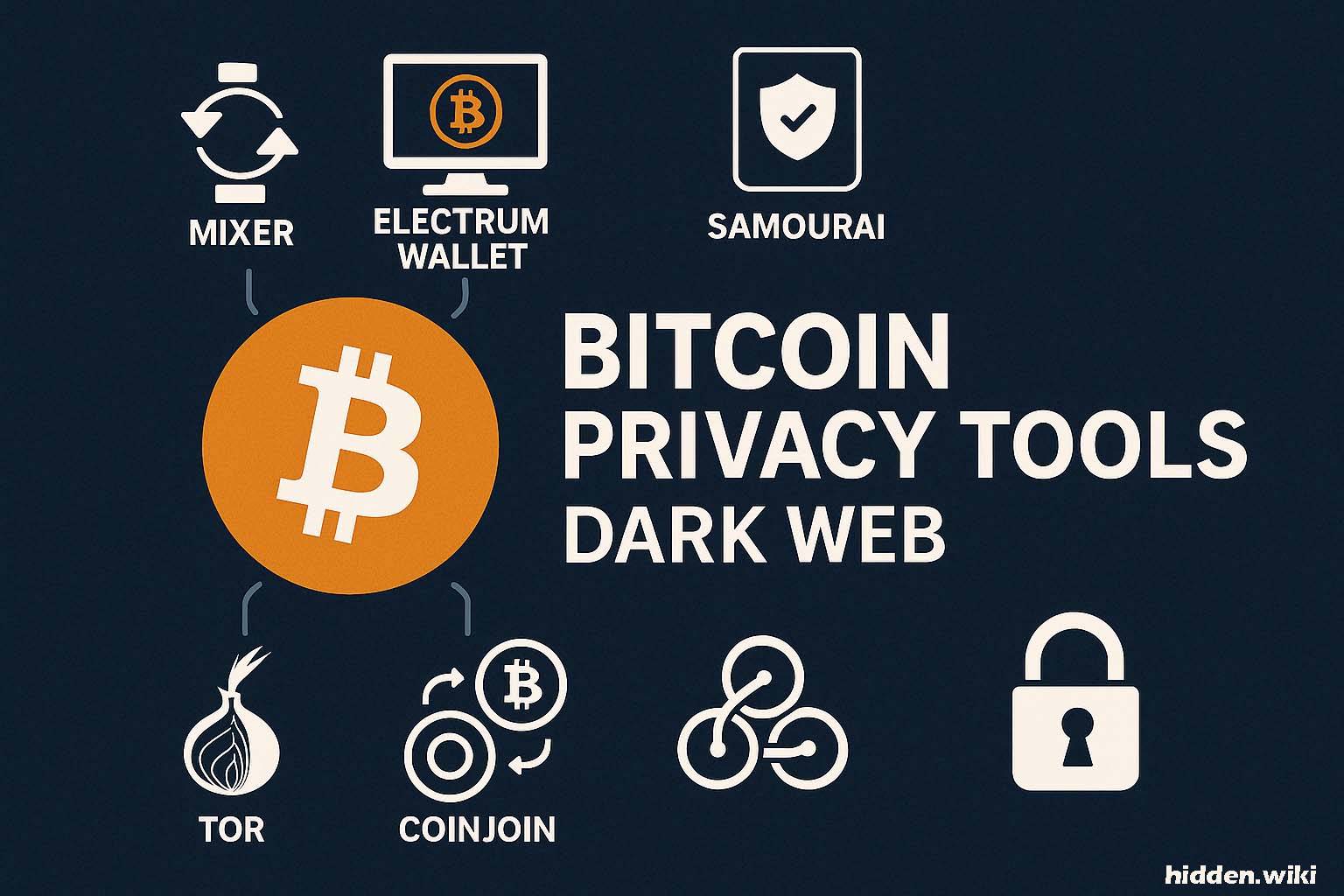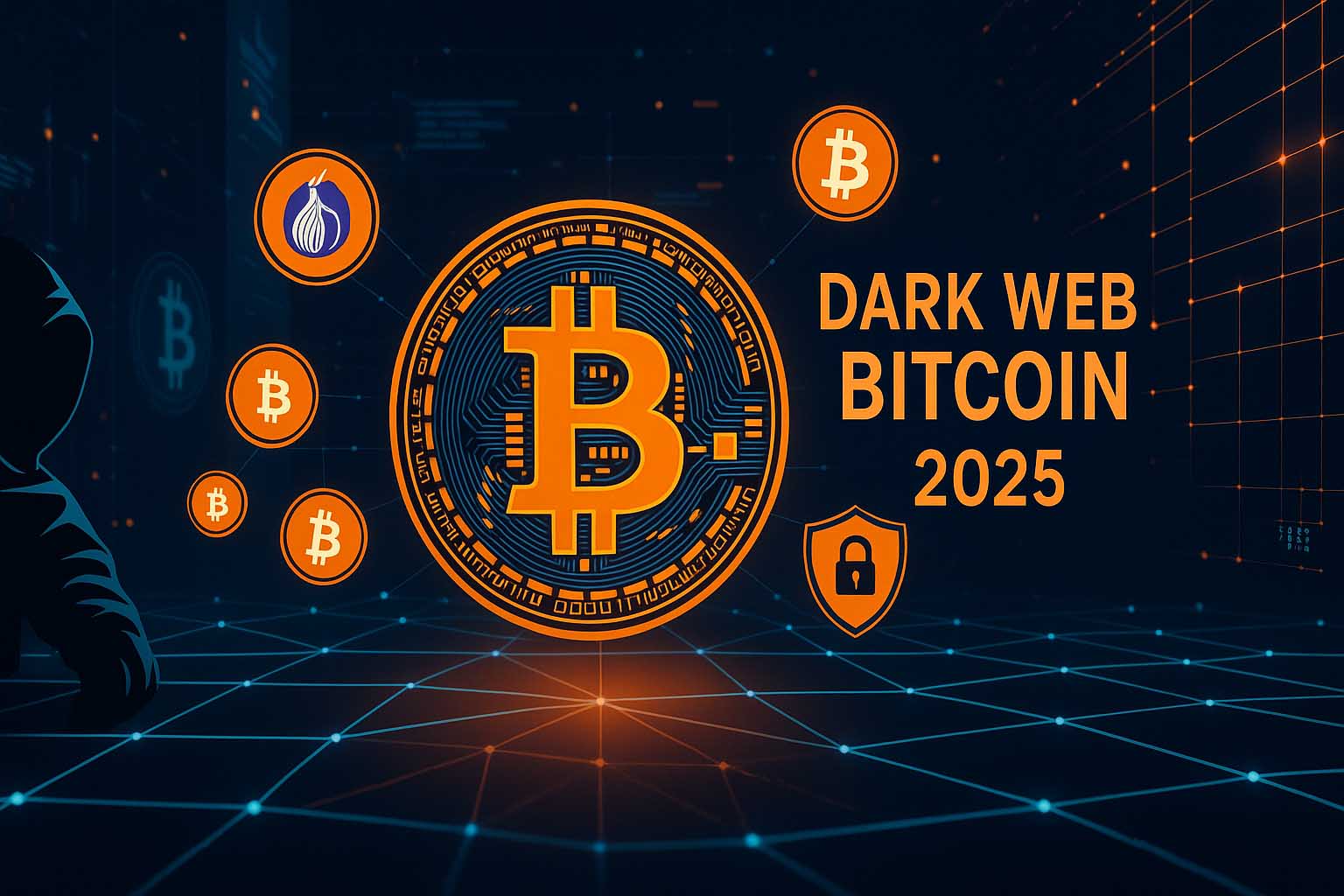Why Bitcoin and the Dark Web Are Still Linked
Since the early 2010s, Bitcoin has been synonymous with the dark web. This connection wasn’t the result of a marketing campaign or technological partnership—it was born out of necessity. The dark web, accessible only through anonymity networks like Tor, became a haven for marketplaces, forums, and services that required payment systems independent of banks and identity verification. Bitcoin emerged at just the right time: a decentralized currency, pseudonymous by design, and capable of operating entirely outside traditional financial infrastructure.
The rise of Silk Road, the first major dark web marketplace, cemented this link. Every transaction on the site was conducted in Bitcoin, and the success of that model inspired hundreds of similar platforms. At a time when privacy concerns were growing and censorship resistance was valued, Bitcoin offered a working solution. Users could send funds across borders without revealing their names, and vendors could receive payment without relying on banks or PayPal.
Users could send funds across borders without revealing their names and list services on privacy-first directories like the Hidden Wiki site—all without relying on traditional payment platforms.
More than a decade later, the association between Bitcoin and the dark web hasn’t disappeared. While newer privacy-focused coins like Monero have gained traction, Bitcoin remains widely accepted across most onion markets. Its liquidity, ease of access, and global recognition make it hard to replace. Many entry-level users still acquire Bitcoin through exchanges or peer-to-peer platforms before converting it to other currencies, if at all.
In 2025, Bitcoin’s role on the dark web is no longer about being the most private—it’s about being the most usable. Despite its traceable blockchain, it remains the first step in nearly every dark web transaction. Its legacy, infrastructure, and sheer ubiquity continue to link it closely with anonymous online ecosystems.

Is Bitcoin Still the Top Currency on the Dark Web in 2025?
In 2025, Bitcoin remains the most commonly used cryptocurrency on the dark web, despite the growing popularity of privacy-focused coins like Monero and the increasing adoption of stablecoins, such as USDT. The reasons are both historical and practical. Bitcoin’s deep-rooted presence in darknet markets, its wide availability, and its integration into most existing systems make it difficult to displace, even if it no longer offers the best privacy features.
Monero has gained significant traction over the past few years, especially among users and vendors who prioritize anonymity. Unlike Bitcoin, Monero transactions are fully obfuscated, hiding sender, recipient, and transaction amount. This makes it ideal for users looking to avoid blockchain tracing. However, Monero’s limited support on mainstream exchanges and wallets has slowed its mass adoption, particularly for first-time users entering the dark web ecosystem.
Ethereum, while powerful in terms of smart contracts and decentralized applications, is rarely used for dark web transactions due to its high fees and traceability. USDT and other stablecoins have gained momentum for price stability, but they’re often tied to centralized issuers, making them less appealing for anonymity-focused transactions.
Despite these alternatives, Bitcoin remains the go-to currency in most onion markets. Its liquidity, ease of purchase, and universal recognition keep it in a leading position. While users seeking maximum privacy may route their Bitcoin through mixers or convert it to Monero after initial purchase, Bitcoin still serves as the gateway to dark web commerce. Its continued relevance highlights how utility often outweighs perfect anonymity in underground digital economies.
How Bitcoin Transactions Work on the Dark Web
To make a purchase on the dark web using Bitcoin, most users begin by buying the cryptocurrency from an exchange or peer-to-peer platform. Popular options include Binance, Coinbase, or local Bitcoin ATMs. Although many exchanges require ID verification, users can regain privacy by transferring their Bitcoin to a non-custodial wallet like Electrum or Samourai.
Next, privacy-minded users often use a Bitcoin mixer or tumbler. These services obscure transaction trails by splitting and rejoining coins through multiple wallets. While not perfect, this step makes it harder to trace the origin of funds on the blockchain.
With funds secured in a private wallet, users connect to the Tor network. Once inside, they choose a dark web marketplace and create an account using a pseudonym. After selecting a product or service, the marketplace provides a unique Bitcoin address. The user sends funds to this address from their wallet.
Most marketplaces hold the payment in escrow. The vendor ships the item, and the marketplace releases the funds once the buyer confirms delivery. Reputable sites also use multi-signature wallets for added security and fraud prevention.
From purchase to delivery, the entire process can remain anonymous—if done carefully. Each step, from mixing coins to using Tor, plays a role in hiding the user’s identity. Even though Bitcoin’s blockchain is public, it still supports countless dark web transactions thanks to its flexibility and global availability.

Tools That Enhance Bitcoin Privacy on the Dark Web
Although Bitcoin isn’t fully anonymous, several tools help users improve privacy when making transactions on the dark web. These tools don’t make Bitcoin invisible, but they reduce traceability and improve the user’s control over their digital identity.
One of the most widely used privacy tools is the Bitcoin tumbler, also known as a mixer. These services take a user’s Bitcoin, combine it with other coins from multiple sources, and then return freshly mixed Bitcoin. By doing this, they break the direct link between sender and receiver. Tumblers introduce randomness in both amount and timing, which complicates blockchain analysis. While not flawless, they make it harder for third parties to trace transactions through public records. A technical breakdown of how mixing works can be found in this privacy guide from Bitcoin.org.
Wallet choice also plays a key role in preserving privacy. Many users avoid keeping Bitcoin in exchange wallets. Instead, they rely on non-custodial wallets like Electrum, which let users control their private keys and operate without identity checks. Electrum is lightweight, fast, and can run entirely over the Tor network for added security.
More advanced users prefer privacy-focused wallets such as Samourai or Wasabi Wallet. These wallets go a step further by offering features like CoinJoin, Tor integration, and transaction obfuscation. Samourai, for example, includes stealth modes and IP-hiding features designed for privacy. Wasabi Wallet, on the other hand, is known for its strong CoinJoin implementation, allowing users to blend their coins with others before sending them.
When used correctly, these tools form a privacy shield around Bitcoin usage on the dark web. While no method is entirely foolproof, combining tumblers with privacy wallets and Tor access gives users a significantly higher level of anonymity during transactions.

Real Use Cases – How Bitcoin Is Used on Dark Web Markets
Bitcoin remains a vital payment method for a wide range of services on the dark web. While many platforms have come and gone, the structure of transactions hasn’t changed much. Buyers still rely on Bitcoin to access everything from digital services to illicit goods. Although specific marketplace names may change, the use cases often remain consistent. Many of these markets and service portals can be found in our 2025 list of verified onion sites, which includes active links still accepting Bitcoin for transactions.
On typical darknet markets, Bitcoin is the default payment option. A user may want to purchase a fake identity document, access hacking tools, or obtain a rare book that’s banned in their country. After connecting to the Tor network and logging into a dark web marketplace, the buyer selects a product, transfers Bitcoin to an escrow wallet, and waits for the vendor to fulfill the order. Once the buyer confirms delivery, the funds are released to the seller.
Some platforms offer more than just goods. Many onion sites accept Bitcoin donations for privacy-focused services like encrypted email, whistleblower hosting, or censorship-resistant blogs. Others allow users to pay for membership access using Bitcoin, granting them entry to restricted forums or investigative archives.
Vendors and buyers both favor Bitcoin for its familiarity and wide support. Even with the growing interest in privacy coins, Bitcoin’s presence across nearly every market keeps it relevant. It acts as a universal entry point, especially for newcomers who may not understand how to use alternatives like Monero.
In most use cases, Bitcoin is not chosen for being perfectly private, but for being dependable, accessible, and well-integrated into dark web market systems. Its continued presence underscores its role as the digital cash of underground networks.
Bitcoin Risks on the Dark Web – Are You Truly Anonymous?
Many users assume that using Bitcoin on the dark web guarantees anonymity. In reality, Bitcoin is only pseudonymous—not private. Every transaction is recorded on a public blockchain, which can be analyzed to trace patterns, identify wallets, and potentially link activity to real-world identities.
The biggest risk begins at the point of purchase. Most people buy Bitcoin from centralized exchanges that require KYC (Know Your Customer) verification. These exchanges store personal data, including names, addresses, and bank information. Once funds are withdrawn to a wallet, any future use—especially on the dark web—can potentially be traced back to that KYC record. Law enforcement agencies regularly monitor blockchain activity and use subpoenas to request exchange records during investigations.
Blockchain analysis firms now work closely with governments to map out Bitcoin flows. For example, firms like Chainalysis provide law enforcement with tools to monitor transactions and identify suspicious wallet behavior. These companies use advanced tools to detect mixing patterns, identify suspicious wallet clusters, and follow funds through complex transaction chains. While mixers offer a degree of privacy, they don’t always succeed in breaking the trace. Some mixing services have even been seized or secretly operated as honeypots, collecting user data for future investigations.
Authorities also run undercover dark web markets or forums to gather intelligence. By watching wallet addresses used on these platforms, they can build databases of user behavior over time. Even minor mistakes—like reusing a Bitcoin address or accessing Tor without VPN protection—can compromise anonymity.
Bitcoin still plays a central role on the dark web, but using it without privacy tools invites real risk. Without caution, the illusion of anonymity can quickly collapse under the weight of blockchain transparency and modern surveillance techniques.
Dark Web Bitcoin Alternatives Gaining Popularity
While Bitcoin still dominates dark web transactions, a shift toward privacy-focused cryptocurrencies is well underway. Many vendors and privacy-conscious users are now turning to coins like Monero, Zcash, and other lesser-known privacy tokens that offer stronger protection against surveillance and blockchain tracking.
Monero (XMR) is the most widely accepted Bitcoin alternative on the dark web. Its key feature is full transaction anonymity. Unlike Bitcoin, Monero hides the sender, recipient, and transaction amount by default. This makes it extremely difficult to trace activity, even with advanced forensic tools. Some vendors now accept only Monero, especially for high-risk transactions that require total privacy.
Zcash (ZEC) offers a more selective approach to privacy. It allows users to choose between transparent and shielded transactions. Although it’s not as popular as Monero on the dark web, it still provides advanced encryption and is supported by some marketplaces that offer optional privacy features.
Other coins, such as Dash and Pirate Chain, also claim to offer anonymity, but they haven’t gained the same level of trust or adoption. Many users prefer Monero simply because of its track record and consistent performance under scrutiny.
The move away from Bitcoin isn’t about rejecting its utility—it’s about reducing risk. As blockchain analysis becomes more sophisticated, privacy coins are becoming essential for those who want to operate discreetly. While Bitcoin remains a gateway, alternatives like Monero represent the next step for users who demand deeper anonymity in 2025.
How Law Enforcement Tracks Bitcoin on the Dark Web
Law enforcement agencies have developed advanced techniques to trace Bitcoin transactions across the dark web. While Bitcoin was once seen as untraceable, its public blockchain has become a valuable tool for investigators. Agencies like the FBI, Europol, and IRS Criminal Investigation now work closely with blockchain analytics firms to uncover illicit financial activity.
These firms—such as Chainalysis, CipherTrace, and Elliptic—build software that maps out wallet clusters, identifies transaction patterns, and tracks movement between addresses. By combining blockchain data with information from regulated exchanges, investigators can often link Bitcoin flows back to real-world identities. When users withdraw funds from a KYC-compliant exchange or reuse wallet addresses across services, they expose themselves to tracking.
One of the most famous examples is the Silk Road takedown, where blockchain analysis helped the FBI follow Bitcoin trails to Ross Ulbricht, the site’s creator. In another case, the Hydra marketplace, once the largest Russian-speaking darknet platform, was dismantled after German authorities used transaction monitoring tools to map vendor activity and seize associated servers.
Authorities also run undercover operations on dark web forums. They pose as buyers or vendors, collecting wallet addresses and observing transaction behavior over time. By doing this, they build digital fingerprints that persist across platforms.
While Bitcoin enables fast, borderless payments, its transparency makes it vulnerable to tracing. As surveillance tools evolve, users relying solely on Bitcoin without proper privacy steps face increasing risk. Law enforcement doesn’t just watch the dark web—they follow the money, and Bitcoin leaves a trail.
![]()
From Bitcoin to Monero – How Users Shift for Better Privacy
Although Bitcoin remains the most widely used cryptocurrency on the dark web, a growing number of users are switching to Monero to protect their privacy. This shift often begins with Bitcoin, simply because it’s easier to buy. Once acquired, users then convert it into Monero—a process designed to reduce traceability and limit exposure to blockchain surveillance.
Most people start by purchasing Bitcoin through centralized exchanges, peer-to-peer platforms, or Bitcoin ATMs. After securing the funds in a non-custodial wallet, privacy-minded users take the next step: conversion. One of the most popular methods is using platforms like LocalMonero, which enables users to trade Bitcoin for Monero without going through a centralized exchange or revealing their identity.
Others use decentralized swap services that allow wallet-to-wallet exchanges without KYC requirements. These tools reduce the risk of leaving digital fingerprints and avoid linking Monero purchases to real-world identities. Some even use privacy wallets like Samourai or Cake Wallet, which support both Bitcoin and Monero, to simplify the swap process within one ecosystem.
Bitcoin may be convenient, but it’s inherently transparent. Monero, on the other hand, uses stealth addresses and ring signatures to hide transaction details by default. That’s why many dark web users treat Bitcoin as an entry point rather than a destination.
By converting to Monero shortly after purchase, users create a buffer against blockchain analysis. This behavior reflects a growing awareness that privacy isn’t guaranteed by default. Instead, it’s something users must actively pursue—and switching from Bitcoin to Monero is one of the most effective ways to do it.
Why Some Markets Still Prefer Bitcoin Over Privacy Coins
Despite the rise of privacy-focused cryptocurrencies like Monero, many dark web markets continue to prefer Bitcoin. This isn’t because Bitcoin offers better anonymity—it doesn’t. Instead, its dominance comes from practicality, liquidity, and ease of use. For both vendors and buyers, Bitcoin remains the path of least resistance.
One key factor is liquidity. Bitcoin is the most traded cryptocurrency in the world, which means users can easily buy and sell it across hundreds of platforms. This accessibility makes it ideal for newcomers and experienced users alike. In contrast, Monero is often unavailable on major exchanges and harder to convert into fiat currency, especially in countries with stricter regulations.
User onboarding is another reason. Most first-time dark web users are more familiar with Bitcoin than with lesser-known privacy coins. It’s easier to find guides, wallet support, and customer service for Bitcoin, making the process less intimidating. Marketplaces know this, and they prioritize Bitcoin support to ensure user adoption remains high.
Infrastructure also plays a role. Many older marketplaces built their systems around Bitcoin. Updating to support privacy coins requires significant changes in escrow systems, wallet management, and transaction monitoring. For some platforms, the cost and complexity of switching outweigh the privacy benefits.
While Monero continues to gain traction, Bitcoin still offers unmatched convenience. Its widespread support, exchangeability, and integration make it the default option—even if it’s no longer the most private. Until privacy coins become as easy to use and as liquid as Bitcoin, many markets will continue to favor the original cryptocurrency.
Final Thoughts – Is Bitcoin Still Viable for Privacy in 2025?
In 2025, Bitcoin remains a central part of the dark web ecosystem—not because it guarantees anonymity, but because it still offers unmatched accessibility. Its role has shifted from being the “anonymous internet currency” to a gateway into more private systems. With the right precautions, Bitcoin can still be used in ways that protect user identity, but it is no longer privacy-first by default.
Users who want to stay safe must take extra steps. This includes avoiding KYC exchanges, using non-custodial wallets, connecting through Tor, and employing tools like mixers or privacy wallets. For those who prioritize deeper anonymity, converting Bitcoin to privacy coins like Monero remains one of the most effective strategies available.
Bitcoin’s transparency is both its strength and weakness. It ensures security and global trust, but also leaves a trail that can be analyzed. Still, its global reach, liquidity, and deep integration into dark web markets make it difficult to replace entirely.
As blockchain surveillance becomes more advanced, Bitcoin alone won’t guarantee privacy. However, when used properly, it still has a place in anonymous online transactions. Whether as a stepping stone to Monero or a standalone method with privacy tools layered in, Bitcoin remains viable—for now. The key is not the coin itself, but how users choose to use it.

